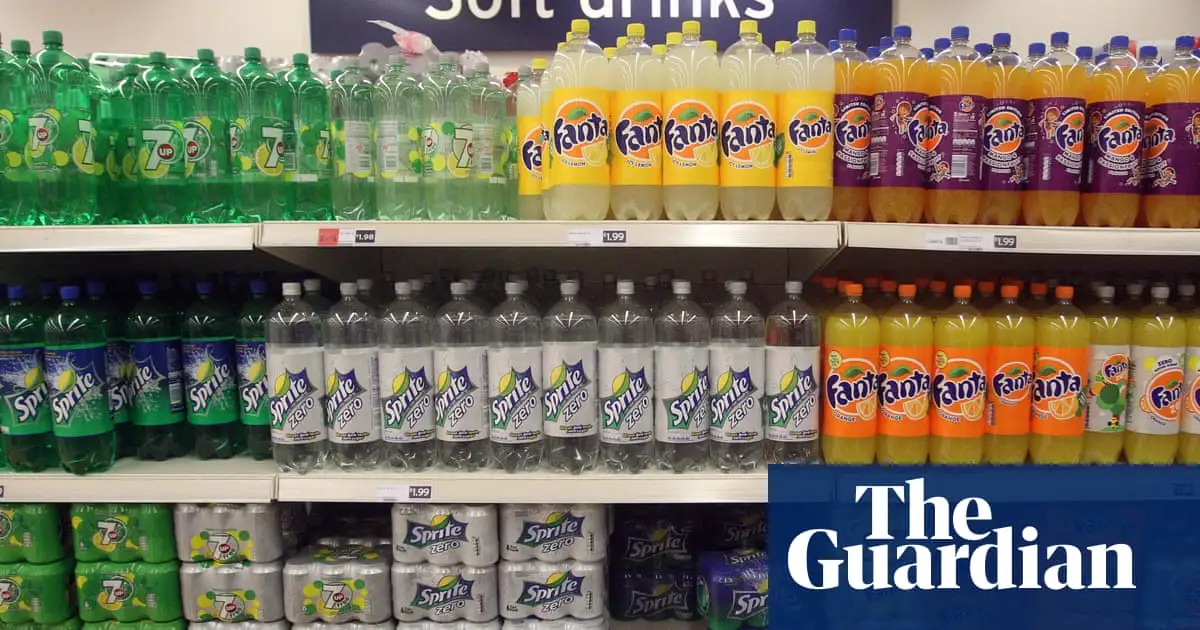- cross-posted to:
- hackernews@lemmy.smeargle.fans
- cross-posted to:
- hackernews@lemmy.smeargle.fans

I’d be interested to know how much of that is from reduced sales, how much is from products reducing the overall sweetness, and how much is the products being full of (controversially potentially worse) artificial sweeteners and other crap to replace the sugar.

Where are you getting that they’re potentially worse? They may have some adverse effects but they seem minor compared to sugar. For aspartame there seems to be some studies possibly linking it with cancer, but those are very limited and even after those studies came out the WHO reaffirmed it’s safety at normal levels. Meanwhile actual sugar has been proven to cause diabetes, heart disease, obesity etc. Sucralose doesn’t seem to show any adverse effects at normal doses.
A lot of the controversy on artificial sweeteners comes from the sugar lobby combined with moral panics and conspiracies on using “chemicals” in foods.

I did say “controversially” and “potentially” :)
I think it was the WHO who mentioned it last year, but it keeps cropping up each year from various university studies - of course I’ll have only ever read the news reports of those studies.
I absolutely agree though, I’d be highly suspicious of sugar company (or high-fructose-syrup) lobbying.
Personally my preference is for “things to just be less sweet” (like why does some bread or soup have sugar in now?!?), though I suspect it’s a bit of a minority opinion :)

The WHO advises not to use them https://www.who.int/news/item/15-05-2023-who-advises-not-to-use-non-sugar-sweeteners-for-weight-control-in-newly-released-guideline
Personally I don’t agree with their reasoning, but given the controversy I don’t feel comfortable forcing them on people.

They advise not to use them for weight control. That’s a bit different than what you’re implying.

Also almost 100 percent of soft drinks went from nice to absolutely disgusting at least in my opinion.

I’d seriously like to see some double-blind tests on how effectively people can tell the difference between artificial sweeteners and sugar.
Like, there have been some pretty damning studies on wine with double-blind tests that have shown that while people may well have a different experience with different wines, they tend to link it with price when they know what they’re drinking, and the desirability becomes pretty disconnected from price once the labels are out of the picture.
I can tell the difference between straight stevia and sugar, because that’s got a bit of a flavor. But for other sweeteners?
I don’t notice the difference between Diet Coke and regular Coke, and that’s one that people tend to say that they can, much less Coke Zero.
But, okay. Say some people legitimately can taste the difference between sugar and a specific sweetener.
I kind of wonder how practical it’d be for those mix-at-drink-time machines to let you choose not just the drink you’re using, but also the sweetener. Want aspartame, use aspartame. Want Splenda, use Splenda. Want cane sugar concentrate or corn syrup concentrate, use those.
I mean, it’s pretty common in the US to have several types of powdered sweetener for coffee, let the customer choose. I’d think that we could do it with liquid sweeteners in soda too. Hell, let people adjust how sweet they want the drink, if you’ve already gone that far.

Are you actually saying some people don’t get that horrible aftertaste because It’s very obvious to me and there’s no way to mistake it.
I was close to vomiting when I noticed it in “supposedly Normal” Pepsi recently that leaves coca cola as the sole one I think think hasn’t done it yet. When that’s gone I guess I’m stuck with water.

Are you actually saying some people don’t get that horrible aftertaste
I don’t drink many fizzy drinks anymore but I don’t recall ever getting a horrible aftertaste, maybe it’s one of those things like asparagus that only affects some people

Diet Coke leaves a nasty metallic taste in my mouth, can’t stand the stuff. Coke Zero on the other hand mostly tastes ok to me, unless I’m eating chocolate & then it gets a similar nasty aftertaste to it as well. Nearly all other soft drinks are now sugar free & I’ve not found one I like anymore, some I’ve even spat out on initial sip as they taste so rank to me.
Thankfully I’ve grown to like sparkling water the past few years, used to hate it, & often have that instead if I fancy something fizzy.
Classic lemonade also still seems to be available with sugar, which is nice as an occasional treat…

The old Coke Zero was amazing! It tasted closer to regular Coke without the extra sweetness that sugared colas have (regular colas taste like pancake syrup to me.) I was disappointed a few years ago when they tweaked the flavor. I think they sweetened it a little more to bring it closer to Pepsi’s level of sweetness, which I don’t particularly care for. After a year of not tasting the old formula of Coke Zero, the new one is ok. So really it’s probably for the best since I drink less of it now lol (good goin Coke lol.)

I personally find it quite easy to differentiate between different artificial sweeteners.
I also used to be on a medication with a mild interaction with phenylalanine, which is in aspartame, so I could tell if I drank something with that.

Its weird, I prefer the taste of coke zero to coke classic and the same with Pepsi. But the diet version of both is vile.

Because most soft drinks replaced the sugar with artificial sweeteners… No real sugar allowed for the proles.
I try hard to get the real sugar drinks nowadays.
I maybe drink 1L a month, so not a huge expense thankfully.
This is the best summary I could come up with:
The tax, which came into force in April 2018, has been so successful in improving people’s diets that experts have said an expansion to cover other high sugar food and drink products is now a “no-brainer”.
But despite this reduction, the amount of sugar consumed by adults and children still remains above the recommended guidelines and is contributing to high levels of tooth decay, obesity, diabetes and other illnesses.
According to the World Health Organization and the UK Scientific Advisory Committee on Nutrition, the consumption of free sugar should be below 5% of a person’s total calorie intake.
These results are consistent with previous research which show a reduction in household purchasing of sugar from soft drinks one year after adoption of the levy.”
“With a new government now in place, policymakers are urged to consider applying a similar levy to other discretionary products that are key contributors to sugar intake, such as chocolate confectionery, to shift diets towards a healthier direction.”
A Department of Health and Social Care spokesperson said: “This government will take action to prevent ill-health and tackle the obesity crisis head on, easing the strain on the NHS and helping people to live well for longer.
The original article contains 724 words, the summary contains 200 words. Saved 72%. I’m a bot and I’m open source!

Yes, that tends to happen when you remove half the sugar… who’d have thunk it?

They didn’t mention how it affected overweight/obesity rates, which is what they aimed to tackle. Every research I found had problems in its modelling or just straight up speculative.
Plus they are not actually using the extra income for related programmes instead they include it in the general budget, which is not nice…making it just a tax.
Although from a dental perspective there is no way it’s not working.
Why are other countries are not struggling with obesity rates is what I would like to know even without a sugar tax.
I just hope they are not planning to introduce a salt tax, food is already bland as is.

the guardian has messed up their headline a bit here. The paper they’re citing attributes a 9.7% decrease in children’s total sugar consumption to the sugar tax.
The “sugar consumption halved!” is more accurately: “free sugar from soft drinks only” dropped from 22g per day (pre-tax) to 12g per day (post-tax).
Considering “Children aged 7 to 10 should have no more than 24g of free sugars a day” is the recommended amount - a reduction from 22g to 12g from changes to soft drinks alone is still a big win
- Mindtraveller ( @Mindtraveller@lemmy.blahaj.zone ) English1•2 months ago
Great, now all the undernourished kids with poor parents are going to drink water instead and lose weight to dangerously unhealthy levels.
According to The Guardian (same source as this article), the number of children in food poverty in the UK is 4 million. 15% of UK households went hungry in January. Now, soda isn’t the smartest source of calories in a kid’s diet. It’s expensive and low in other nutrients. But kids aren’t always smart. A poor kid thinks “I’m hungry, I have a few pounds, there’s a vending machine, problem solved”. If the soda is too expensive, that doesn’t mean the kid is going to go to Aldi, buy some potatoes, and roast them for a cheap and nutritious meal. They’re a kid! It means they’ll pay more or go without. Which means you’re making the poverty and malnutrition problem worse.
Can I just clarify: Your point of view is that a tax to disincentivise sugar in fizzy drinks is going to cause malnutrition in underprivileged kids?
Would you have also argued this when we removed fizzy drink vending machines from schools a decade ago?


